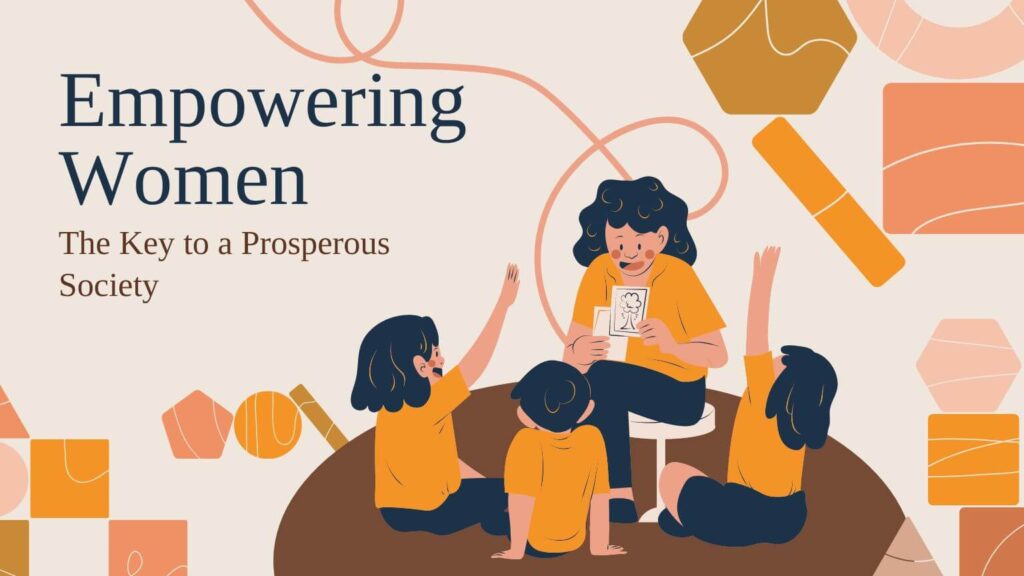Gender equality has become a major focus worldwide, as societies recognize the importance of providing equal opportunities for everyone, regardless of gender. In countries like India, where traditional values have long influenced societal roles, the topic of gender equality holds immense significance. Although steps have been taken to address issues like gender inequality in India, there is still much progress to be made, especially in sectors like education, politics, and the workplace.
This blog explores the role of gender equality in fostering a prosperous society, with a focus on how empowering women can drive societal progress.
The Importance of Gender Equality
What Is Gender Equality?
Gender equality means that individuals of all genders have equal rights, responsibilities, and opportunities. It is the cornerstone of a just society, ensuring that no one is discriminated against based on their gender. Whether in education, politics, or the workplace, the need for equality is paramount in promoting a healthy and balanced world.
Addressing Gender Inequality in India
In many parts of India, gender inequality remains a persistent issue. Women often face discrimination, limited access to education, and restricted job opportunities. While legal reforms have been introduced to uplift women, social and cultural barriers continue to impede progress. Addressing this inequality requires a combination of policy changes, education, and community-level initiatives that challenge traditional norms.
The Role of Women in Economic Growth
Empowering Women in the Workforce
Providing women with equal opportunities in the workforce is not only a matter of justice but also of economic growth. Research shows that countries with higher levels of gender equality have stronger economies. Gender equality in the workplace can boost productivity, increase innovation, and help businesses thrive. When women are given the same opportunities as men, they can contribute their unique talents and perspectives, leading to a more dynamic and inclusive work environment.
Benefits of Gender Diversity in Leadership
Leadership positions have traditionally been male-dominated, but that is slowly changing. Gender diversity in leadership roles leads to better decision-making and fosters a more inclusive organizational culture. Companies that prioritize gender diversity often see better financial performance and higher employee satisfaction. Encouraging women to take on leadership roles is crucial to achieving long-term gender equality in the workplace.
Education as a Tool for Gender Equality
Access to Education for All
Education plays a vital role in breaking the cycle of inequality. By ensuring equal access to education for both boys and girls, societies can foster a more empowered generation. Girls’ education has been proven to have a ripple effect on family health, economic development, and social progress. Governments and organizations must work together to improve access to quality education for girls in rural and underserved areas.
Promoting Gender Awareness in Schools
Schools are the foundation for building a gender-equal society. Educators should incorporate gender awareness into the curriculum, encouraging both boys and girls to challenge traditional gender roles. This can help foster an environment where children grow up with a more inclusive view of the world, where equal opportunities are a basic right for everyone.
Read Also>>> Campus Management Systems: Revolutionizing Educational Institutions
Legal and Social Reforms
Legislation for Gender Equality
To address gender inequality in India, the government has implemented several legal reforms. Laws aimed at promoting women’s rights, ensuring equal pay, and preventing workplace harassment are steps in the right direction. However, the success of these laws depends largely on their implementation and enforcement. More needs to be done to educate both employers and employees about their rights and responsibilities when it comes to gender equality.
Social Movements and Change
Social movements have been instrumental in promoting gender equality in India. Activists and organizations continue to fight for women’s rights, challenging deep-rooted social norms and advocating for more significant changes in policies and societal behaviors. Campaigns that focus on empowering women, promoting education, and addressing gender-based violence are vital in shifting mindsets and encouraging broader acceptance of gender equality.
Challenges and the Path Forward
Breaking Stereotypes
One of the biggest challenges in achieving gender equality is breaking traditional gender stereotypes. Women are often viewed as primary caregivers, while men are seen as breadwinners. These roles limit individuals from realizing their full potential. Breaking these stereotypes requires concerted efforts from all sectors of society, including families, schools, and workplaces.
Achieving Equal Pay
The wage gap between men and women continues to be a significant issue globally. Equal pay for equal work is a fundamental principle of gender equality, yet many women are still paid less than men for the same job. Bridging this gap requires transparency in pay structures, legal reforms, and an ongoing commitment from companies to review and adjust their compensation policies.
Read Also>>> Overseas Education Consultants: Your Guide to Study Abroad
The Impact of Gender Equality on Society
Health and Well-being
Gender equality leads to improved health outcomes, not just for women but for entire communities. When women have access to education, healthcare, and job opportunities, they are better able to care for their families and contribute to the overall well-being of society. Gender equality also helps reduce instances of domestic violence and other forms of gender-based violence, as women gain more autonomy and power in their relationships.
A More Inclusive Future
By working towards gender equality, we are paving the way for a more inclusive and prosperous future. Societies that embrace equality tend to be more innovative, diverse, and successful. They benefit from the full participation of all their citizens, regardless of gender, leading to stronger economies, healthier populations, and more vibrant communities.
Conclusion
While significant strides have been made in addressing gender inequality in India and promoting gender equality in the workplace, there is still much work to be done. Achieving true gender equality requires collective efforts from individuals, businesses, and governments. By empowering women through education, addressing societal norms, and promoting equal opportunities in all sectors, we can create a more just and prosperous society for everyone.
As we continue to challenge gender biases and fight for equal rights, we move closer to a world where everyone can thrive, regardless of their gender. The journey toward gender equality is long, but the benefits it brings to society are undeniable.



